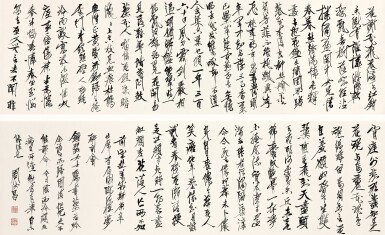Fine Chinese Paintings
Fine Chinese Paintings

趙岡、陳鍾毅伉儷收藏書畫(編號3036-3048)│ Property From the Collection of Professor Kang and Jessica Chao (Lots 3036-3048)
周汝昌 行書〈葬花吟 | Zhou Ruchang, Poetry by Cao Xueqin
Auction Closed
April 30, 09:39 AM GMT
Estimate
45,000 - 90,000 HKD
Lot Details
Description
Property From the Collection of Professor Kang and Jessica Chao (Lots 3036-3048)
Zhou Ruchang
1918-2012
Poetry by Cao Xueqin
ink on paper, handscroll
signed, with 2 seals of the artist
33.5 x 226.5 cm 13⅛ x 89⅛ in.
----------------------------------------------
趙岡、陳鍾毅伉儷收藏書畫(編號3036-3048)
周汝昌
1918-2012
行書〈葬花吟〉
水墨紙本 手卷
款識:(曹雪芹〈葬花吟〉,文略)前年赴美威斯康辛出席首屆國際〈紅樓夢〉研討會。鍾毅女士囑書〈葬花吟〉,余諾之,而歸圖後忙冗,久不能報命。今日陰而冷,頗非病目所適,勉為走筆,自不能佳也。周汝昌。
鈐印:「周汝昌目壞後所書」、「世載為芹」。
註:一九八○年,周汝昌獲邀赴美參加第一屆國際〈紅樓夢〉研討會,一九八六年,復應邀任威斯康辛大學訪問教授,與趙氏共事。本幅即應陳鍾毅所囑寫曹雪芹〈葬花吟〉以誌。
33.5 x 226.5 cm 13⅛ x 89⅛ in.
Property From the Collection of Professor Kang and Jessica Chao (Lots 3036-3048)
The Collection of Professor Kang and Jessica Chao began in 1938 when Zhang Shanzi gifted Lot 3047, Tiger by the River to Kang Chao’s father, Zhao Ximeng (1899-1956). Ximeng was at the forefront of literature, poetry, art and politics from the 1920s to the early 1950s in China. During the Sino-Japanese war, he wrote patriotic articles in the Morning Light News and was a war correspondent for the Ta Kung Pao. In 1944, the famous Chinese artist Zhang Daqian, added the inscription and painted the grasses in the foreground during one of his visits to Ximeng while in Liaoning.
After his father’s death in 1956, Kang Chao inherited the Zhang Shanzi & Zhang Daqian painting, along with the Chao family legacy as a welcome oasis for visiting scholars, artists, writers and change-makers. By the 1980s, Kang Chao was acclaimed for his ground-breaking and bold analysis of China’s economic development, had co-founded the Chinese Institute for Economic Research in Taipei, and was one of the foremost Redologists in the world. He and Jessica were extraordinarily committed partners—in work as well as life. They collaborated on nearly 100 books and publications in both English and Chinese on Economics and the Hong Lou Meng.
As one of the few Chinese faculty members in the American Midwest, Kang and Jessica Chao continued the Chao tradition. They opened their home in Madison, Wisconsin to visiting scholars and artists from China, Taiwan, Hong Kong, Malaysia and beyond. These visitors appreciated being in a familiar environment, discussing topics ranging from art and politics to current events. Most of all they delighted in Jessica’s authentic Chinese cooking at a time when America was just beginning to understand true Chinese culture.
June 1980, Kang and Jessica kicked off the first International Conference on the Dream of the Red Chamber by hosting the opening dinner in their Madison home. The world’s leading redologists, Zhou Ruchang, Qi Gong, Dai Dunbong, Yu Pingbo and Feng Qiyong presented magnificent scrolls with personal dedications to our parents. Those who became close friends would use Kang's familiar name, "Yen-bing” (彥濱). The more formal visitors would use "Professor Kang Chao" (趙岡教授). By the time Kang retired from his professorship at the University of Wisconsin in the mid-90's, he and Jessica had a collection of nearly 100 scrolls of calligraphy and paintings.
In 2017, Kang and Jessica Chao donated their entire collection of rare Hong Lou Meng books and research materials, 40 banker boxes in all, to the Ricci Institute in San Francisco. Their goal was to encourage future generations of young scholars to enjoy the study of the Dream of the Red Chamber. Shortly thereafter, Jessica Chung-yee Chen Chao passed away on November 5, 2020. For Kang Chao, 2021 was a challenging year without his companion of 70 years. On October 23, 2021, he slipped away peacefully to join her.
To honor the legacy of their extraordinary teamwork and to their goal of promoting cross-cultural exchange by sharing the best of East and West cultures, partial proceeds from the sale of this Collection will go towards two projects. The first is to establish scholarships that strengthen cultural bridges between East Asia and the West. The second is to establish a much needed pipeline of Chinese-speaking Caregivers and Home Health Aides to serve our beloved Chinese elders.
